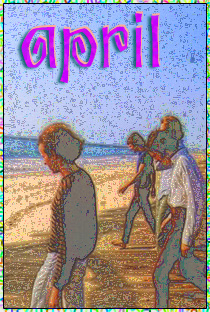|
THE FOLLOWING EVENTS TOOK PLACE ON APRIL 10
1847 - Journalist and newspaper publisher Joseph Pulitzer is born in Budapest, Hungary. He came to the U.S. at the age of seventeen, and joined the army. After he was discharged, he went to St. Louis, became a reporter, and was elected to the State legislature. Then he began to buy newspapers—including the New York World. Later, he endowed the Columbia University School of Journalism, and established annual Pulitzer prizes for literature, drama, music and journalism.
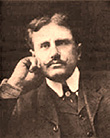 1906 - O. Henry's second short story collection, The Four Million, is published. The collection includes one of his most beloved stories, The Gift of the Magi, about a poor but devoted couple who each sacrifice their most valuable possession to buy a gift for the other. 1906 - O. Henry's second short story collection, The Four Million, is published. The collection includes one of his most beloved stories, The Gift of the Magi, about a poor but devoted couple who each sacrifice their most valuable possession to buy a gift for the other.
 1912 - The Titanic sets sail from Southampton, England. 1912 - The Titanic sets sail from Southampton, England.
1915 - Emmy Award winning actor Harry Morgan is born. His credits include M*A*S*H, Dragnet, Support Your Local Sheriff, Support Your Local Gunfighter, and more.
1921 - Actor Chuck Connors is born Kevin Joseph Connors. Best known as TVs The Rifleman, he also appeared in Roots, The Yellow Rose, Werewolf, Cowboy in Africa, and Branded.
1921 - Singer/songwriter and actor Sheb Wooley is born. His most famous song may be The Purple People Eater. His acting credits include Rawhide, High Noon, Rocky Mountain, Giant and Hoosiers.
1925 - F. Scott Fitzgerald's The Great Gatsby is published. Although generally well-received by critics and eventually to become his best-known work of the Jazz Age, sales of his newest work are disappointing.
1930 - Labor leader Dolores Huerta is born in the small New Mexico mining town of Dawson. In the early 1960s, Huerta—along with Cesar Chavez—founded the United Farm Workers union.
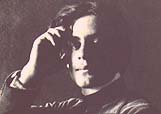
1931 - Lebanese born American philosophical essayist, novelist, mystic poet, and artist, Kahlil Gibran dies in New York. His most popular work, The Prophet has been translated into more than a dozen languages.
1932 - Actor Omar Sharif is born Michael Shalhoub. His film credits include Lawrence of Arabia, Dr. Zhivago, Funny Girl, Funny Lady, Peter the Great, Anastasia and more recently, Hidalgo.
1933 - President Franklin D. Roosevelt establishes the Civilian Conservation Corps (CCC), an innovative federally funded organization that put thousands of Americans to work during the Great Depression on projects with environmental benefits. known as “Roosevelt’s Tree Army,” the project was open to unemployed, unmarried U.S. male citizens between the ages of 18 and 26.
Under the guidance of the Departments of the Interior and Agriculture, CCC employees fought forest fires, planted trees, cleared and maintained access roads, re-seeded grazing lands and implemented soil-erosion controls. They built wildlife refuges, fish-rearing facilities, water storage basins and animal shelters. To encourage citizens to get out and enjoy America’s natural resources, FDR authorized the CCC to build bridges and campground facilities. From 1933 to 1942, the CCC employed over 3 million men.
Of Roosevelt’s many New Deal policies, the CCC is considered by many to be one of the most enduring and successful. It provided the model for future state and federal conservation programs. In 1942, Congress discontinued appropriations for the CCC, diverting the desperately needed funds to the effort to win World War II.
1953 - House of Wax premieres in New York City. The first color three-dimensional picture, the movie had to be viewed through special glasses.
1954 - Pioneering French film director Auguste Lumiere dies.

1956 - The Stratocaster is patented by Leo Fender.
1957 - Ricky Nelson sings for the first time on the Ozzie and Harriet Show. He sings Fats Domino's I'm Walkin'. Within one week of that broadcast it will sell half a million copies.
1958 - W.C. Handy, known as 'Father of the Blues', dies in New York City. Handy was the first to use the term 'blues' in a song title. He wrote such standards as St. Louis Blues and Beale Street Blues.
1958 - Dick Clark devotes an hour of his American Bandstand afternoon TV show to the memory of Chuck Willis who had died earlier in the day from peritonitis at age thirty. Willis was from Atlanta, GA and recorded hits that included: C.C. Rider, Betty And Dupree, What Am I Living For (his biggest hit) and Hang Up My Rock And Roll Shoes.
1960 - The U.S. Senate passes the landmark Civil Rights bill.
1962 - Film director Michael Curtiz dies; born in Hungary as Mihali Kertesz, he won an Oscar f or Casablanca. or Casablanca.
1962 - Original Beatle Stuart Sutcliffe dies of cerebral paralysis caused by a brain hemorrhage in Hamburg, Germany. Sutcliffe met John Lennon when the two were at art school. Sutcliffe introduced Lennon to modern art and literature and Lennon introduced Sutcliffe to rock & roll. He joined the Beatles and played bass (Paul McCartney was on rhythm guitar at the time). He left the band in 1961 to resume painting. By then he had given the Beatles the look that would soon charm the world, shaggy, brushed-forward hairstyles. Stuart Sutcliffe was 22 years old. His artistic ideas and close friendship with John Lennon had a lasting influence on the band. Sutcliffe's picture appears on the cover of Sgt. Pepper.
1963 - The USS Thresher, an atomic submarine, sinks in the Atlantic Ocean, killing the entire crew. One hundred and twenty-nine sailors and civilians are lost when the sub unexpectedly plunges to the sea floor 300 miles off the coast of New England.
1965 - An English schoolteacher chides parents who permit their children to wear corduroy trousers in the style of the Rolling Stones.
1966 - Jackie Wilson headlines an all-star Easter Sunday concert in St. Louis at Kiel Auditorium. Appearing with him: The Impressions, B.B. King, Ben E. King, The Drifters, and Lavern Baker.
1967 - Paul McCartney visits a Beach Boys recording session and is said to have loaned his production assistance to the track Vegetables for the now-lost Smiley Smile.
1967 - The 13-day strike by the American Federation of Radio-TV Artists (AFTRA) comes to an end less than two hours before the 39th Academy Awards presentation is set to air.
1967 - Bob Hope is the host/referee as Who’s Afraid of Virginia Woolf and A Man for All Seasons duke it out at the 39th Annual Academy Awards. The arena is the Santa Monica Civic Auditorium, Los Angeles. Virginia Woolf comes loaded with 13 nominations, her opponent, A Man for All Seasons, is the underdog with 8. In the end, the envelope holding the title of the Best Picture of 1966 reveals the overall winner as A Man for All Seasons.
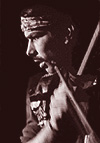
1968 - Drummer Mickey Hart accepts an invitation from Bob Kreuztmann to join the Grateful Dead.
1968 - This was not the usual Monday night Oscar celebration at the Santa Monica Civic Auditorium in LA. In fact, the Academy of Motion Picture Arts and Sciences postponed the 40th Annual Academy Awards ceremonies two days because of the assassination of Dr. Martin Luther King. Ironically, the Best Picture of 1967, In the Heat of the Night, and Guess Who’s Coming to Dinner, have racial themes.
1970 - At a concert in Boston, Doors singer Jim Morrison apparently asks the audience if 'anyone wants to see my genitals,' just after a brief power failure.
1970 - Officially resigning from The Beatles, Paul McCartney disbands the most influential rock group in history at a public news conference. The Beatles hit, Let It Be, is riding high on the pop charts. The last recording for the group, The Long and Winding Road, would be number one for two weeks beginning on June 13, bringing to a close one of contemporary music’s greatest dynasties.
1971 - The Doors' Love Her Madly is released. It eventually hits #11.
1972 - The U.S. and the Soviet Union join with 70 other nations in signing an agreement banning biological warfare.
1972 - Once again, the 44th Annual Academy Awards celebration is held at Los Angeles’ Dorothy Chandler Pavilion. And, once again, everyone is spellbound waiting to hear who won Best Picture. It wasn’t an easy decision. The nominees are: A Clockwork Orange, Fiddler on the Roof, The Last Picture Show, Nicholas and Alexandra and The French Connection. And the Oscar goes to ... The French Connection.

1972 - As part of his first visit to the United States in 20 years, British film pioneer Charlie Chaplin accepts an honorary Academy Award for his "incalculable" contribution to the art of filmmaking. Chaplin, once America's most successful movie star and director, had left the country under a storm of controversy in 1952.
1975 - Deep Purple guitarist Ritchie Blackmore's personal roadie Ronnie Quinton dies in a car crash in Malibu Beach, Calif.
1975 - Peter Frampton's Frampton Comes Alive! tops the album chart, where it will remain for the next 10 weeks.
1979 - Nino Rota dies. He wrote the main theme for The Godfather, as well as frequently collaborating with 8 1/2 director Federico Fellini.
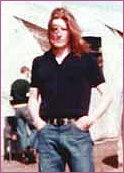
1981 - Imprisoned IRA hunger striker Bobby Sands wins election to the British Parliament.
1990 - Pink Floyd's Dave Gilmour splits from his wife, Ginger.
1991 - Horn & Hardardt closes the last of its 'automats' (coin-operated cafeterias), located at 42nd St. and 3rd Ave in New York City.
1994 - In Seattle, 10,000 people gather for a vigil for the late Kurt Cobain. Courtney Love thanks them for their support and tearfully reads from Cobain's suicide note.
1998 - The Northern Ireland peace talks conclude as negotiators reach a landmark settlement to end 30 years of bitter rivalries and bloody attacks, as Britain's direct rule of Ireland is ended.
Doors History Spotlight: The Boston Arena
1970 - The Doors play 2 shows at The Boston Arena. Highlights include a raw, gutsy version of Roadhouse Blues which includes an a cappella introduction based on lyrics from Rock Me. Without so much as a pause, the band segues into a rousing version of Ship of Fools featuring atmospheric organ work. One of Jim Morrison's legendary screams punctuates the transition from Alabama Song to Back Door Man. This medley is followed by an excellent version of When The Music's Over. Before the 'We want the world' section, the audience is silent, and Jim asks 'What do you want?' Following the wild response, he asks in a singing voice, 'What would you do with it?' to boisterous laughter and applause. then quite unexpectedly, he flatly states, 'I think I'll pass' to thundering applause. A sparse, bluesy rendition of Rock Me follows, showcasing Robbie on guitar, followed by the band quietly slipping into their People Get Ready jam. The tempo then accelerates into Mystery Train. The audience breaks into spontaneous applause. The show continues with Vast Radiant Beach, which has become their customary intro into Light My Fire. In this performance, Robbie's solo takes on a slow waltz tempo, incorporating elements of a jazzy, Coltrane style My Favorite Things and Summertime.
The late show is outstanding, despite the fact that the power is shut off when the show runs overtime. Jim hits the stage in a fury of energy which does not seem to subside as he spins and reels across the stage. During Alabama Song, he slips and falls while climbing a speaker stack, lands flat on his back, and continues the song without missing a beat.
Both performances are recorded for Absolutely Live.
For more day-by-day history go to HistoryUnlimited.net
|
